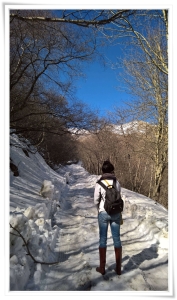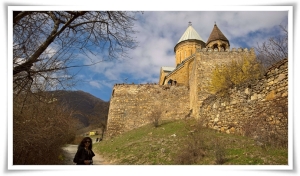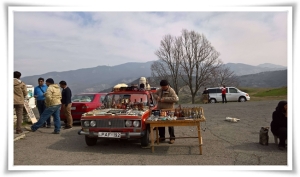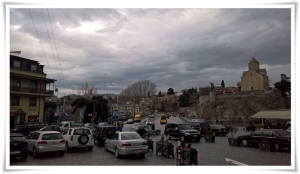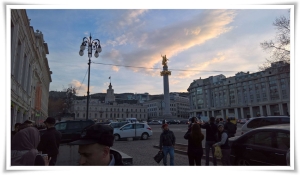A country by three dawns
Landed in Georgia early morning in late February. Women officers with steely eyes at the immigration counters in military style dark blue vests. A legacy of Russian rule? Outside in the semi darkness gypsy children grabbed me by the arms, no letting go till you shell out some Dirhams. Found it difficult to keep eyes open on the long drive to Gudauri. . The city appears drab and dingy by street light. Stepped out onto crunchy snow at the hotel in Gudauri. Our room was wood panelled room with large windows opening into a wide valley and mountains beyond. A thick blanket of snow layabout like candle wax over everything hushing all life. A blade of golden light is faintly playing on a mountain top. The dawn is about to break upon this icy abode.
I stand in the bath room naked, early morning sun warming my torso. A solitary skier is waddling over snow leaving a soft trail in his wake. The toilet bowl had funny design unlike ever seen before. I marvel at it. It’s the exact opposite of what is normal. Was it a mistake or is there an intelligent design behind it. Yet to fathom. Back in the bedroom it’s cold. I pull the heavy curtains closed and snuggle under the blanket. My wife is fast asleep, only her forehead visible under the rough quilt.
Breakfast is continental. There are several Russians and some guests from Philippines at the table. I stuff myself up on of country cheese.
Our Holidayfactory booking does not cover anything except the stay at the hotel. Upon request our hostess manages to arrange transportation for us to Kazbegi. All along the road a thick layer of snow lay in various formations whitewashing every detail. It dominates every sense, and draws attention to itself at every turn. The glare of the sun is blinding. It is similar to what we had experienced during our visit to Antarctica. The sheer cliffs and steep valleys are mesmerizing. The road is narrow, two lane with several dark, wet and dingy tunnels before which we are forced to patiently wait for huge 18 tonner trucks to pass. The trucks are en route to Armenia from Russia via Georgia ever since Turkey has closed it’s borders following disputes with Russia.
Kazbegi was a large town with broad streets, nestling under a towering mountain. The village Gergeti in which the antique church to which we were planning to walk up to stood across the road from it. Our jeep coughed up the narrow alleyways of the village, where old men bunched together and smoked and portly women in native attire screwed their eyes and stared at us, and came to rest near the grilled walls of a cemetery.
We soon realized that our shoes were not appropriate for the climb. Snow had melted into muddy slush and in no time soaked through our shoes. Elsewhere it had hardened into slippery ice. After several falls, smashing through shrubbery to avoid ice , being impaled by a recalcitrant cow, and futile attempts to support ourselves with birch branches, we managed to reach a plateau, about three quarters of the climb to the church. We constantly reprimanded ourselves for our mistake and hardly enjoyed the beautiful scenery around us. The corridor or leafless birch trees where we paused before our next skid and fall was especially sublime, the beauty of which was lost on us completely. Beyond the plateau we would have to push through knee deep snow. Although we desired to go on, the exertion so far had already taken its toll and abandoned our quest. We walked moodily about a bit and decided to return. The walk down filled us with fear of slipping and there seemed no solution except to request a ride in one of the cars which had brought other tourists to the plateau before they climbed up. Fortunately we could hitch a ride in a van which had brought some Russian tourists. On the way down it lurched from side to side and growled in the deep grove of snow. The switchbacks were especially precarious and narrow. The van stopped an inch from the cliff and shifted into reverse gear before finding enough space to turn and veer off. The ride was fun, hanging on to dear life while listening to soulful Russian music.
From Kazbegi we went to the Russian border before returning to Gudauri. This visit was a waste of time since we had to drive a long way along a pot holed road beside a wide river just to have a glimpse of a border control building from the car . Probably I can brag about it someday…
For lunch we had Imerouli Khachapuri, a leavened bread stuffed with cottage cheese with a tangy flavour baked in the shape of a thick pan cake, and fried pork. The quantity was substantial, and we ended up like stuffed dolls with no appetite for anything whatsoever for the rest of the day. We also visited the local supermarket where we stood out like a light house, being the only dark skinned people in town. People were cordial and not overly inquisitive; so we did not feel uncomfortably out of place.
Language wasn’t much of a barrier since most young people spoke reasonably good English. The old only spoke Georgian and Russian, so they were usually taciturn in communication, though generally affable.
The return journey from Gudauri to Tiblisi took us through pristine countryside and occasional towns with run down factories which perfectly fit our mental image of Soviet era communes. Even the most decrepit looking towns had state of the art, concrete and glass police stations which to me looked life a left over of the totalitarian politics under USSR. There were several Russian made Lada cars on the road which our guide dutifully informed only looked ramshackle but had tremendous horsepower. We stopped to look at one of the several roadside stalls selling local honey and country wine. The wine turned out to be undrinkable, tasting more like arrack than wine.
At Ananuri we visited the old orthodox church briefly. A pious old lady in ominous black glided from candle stand to candle stand , lighting each. An intense fragrance of frankincense filled the room. In the pervading gloom, I could pick out the glittering Cyrillic script gilding the edges of murals on the pillars. Outside the church, the air was fresh and minty. Several women, young and old, sold kitschy souvenirs on colourful makeshift stands. We bought a wine glass made of cow horn after being assured that it is an authentic specimen of Georgian country craft.
Tourists were pouring in, mostly Indian, Filippino and Arabic; western tourists were conspicuous by their absence. Possibly, the communist background of the country put them off or there wasn’t enough prostitution to attract them. Georgia was not an expensive destination which accounted for the money conscious Indian traveller. Although the Lari (Georgian GEL officially) was more valuable than the Dirham, food, stay and travel was quite affordable, noticeably accentuating the perceived value for money.
The hotel room we checked into at Tiblisi was small, with just enough room to slide around the edge of the bed. It was located on George Bush street. An imposing print of the ex-president pensively stared at you as you emerged out of the under pass. This was a sign of the change in times and affiliations. One is astonished to notice several expensive cars, especially Japanese 4×4’s on the streets of Tiblisi in peaceful coexistence alongside the Lada and ancient Mercedes Benz. Someone remarked that Georgia was one of the most popular destinations of used cars, which may explain the presence of these cars, or it may have been pure envy on the part of that person at the relative prosperity of Georgians.
Late afternoon, we gathered directions from the hotel and went out shopping at the crowded local market at Vakhsali, where we were certainly and unusual sight going by the curious stares of passers by and shop keepers. The market was full of cheap Chinese stuff from shoes to jeans to buckets. We couldn’t find what we were looking for at the market. We were at the wrong place and wanted to get out. I didn’t remember the name of the place where we wanted to go. The taxi drivers did not speak English and gesticulations proved to be inadequate. Finally I managed to recollect the name of one place and off we went like a hornet. Traffic enforcement was lax and rules were regularly broken with impunity.
Chardini was exactly where we needed to be. It was quintessentially touristy and had several shops selling the kind of souvenirs visitors desired. There were shops selling Georgian Minamkari (enamel) jewellery, others had orthodox church memorabilia, there were carpet shops, an entire section was devoted to elegant restaurants specializing in local cuisine, there were colourful dry fruit shops displaying Churchlela (walnuts embedded in grape jelly) and Gozniaki (sesame chikki), there were tour operators, art shops.. We went on an orgy of window shopping…
The cab we took from Chardini to our hotel was driven by a half crazed man in extreme hurry, who swore at other vehicles, and cut in front of others, honked madly and impatiently drummed his fingers on the steering wheel waiting for the traffic signal to open. There was something bothering him terribly, which wad evident in the lunatic glint in his eyes when I asked him to slow down and drive carefully. I don’t think he understood me correctly. Our chances of survival seemed meagre. In the end we reached the smug figure of George Bush with his pensive stare, and boy I was never so happy as now too see that silly smirk on his face declaring unequivocally that we have reached out destination without been crushed to pulp in a gory accident. In the end, the driver charged us more than usual and sped off in a burst of fumes. We prayed for his safe arrival wherever he was heading…
After nightfall we went to a cultural evening featuring traditional dance, music and food. It was marvellous, all of it – the drumming was high tempo and dashing; the dance a vibrant combination of graceful swings, coquettish gestures and virile foot work; the food – especially the dish with walnut paste stuffed in thin, lightly sautéed aubergine was divine. Truly satiating…
Jvaris monastery is perched high up on a hill top overlooking the old city Mtshteka. It stands tranquil, quiet, solitary and imposing against a vast green meadow from which one could hear an occasional nostalgic clang of cow bells. The priest in the monastery wore an indifferent expression bordering on complete resignation. This is characteristic of being monkish I guess. But the lifelessness of his eyes and the bloodlessness of his cheeks was despairing even to onlookers. He gave out the impression of being tenuously attached to life on earth and was soon to be sitting beside God Almighty in heaven thanks to a dull life within the monastic confines. I know that I am being overly judgmental.
Only the church part of the monastery was open to visitors. It was similar to other orthodox churches we had visited before, dark interior, lighted by flickering candles, golden reliefs on walls, unembellished cross in the middle with a Cyrillic inscription, an aura of brooding mystery.
Outside there was the usual entourage of souvenir sellers of the placid sort, they only displayed their wares and did not aggressively market them, thankfully. Perhaps the ancient weariness of the monastery had seeped into their souls too. There were elderly ladies, dignified in their pursuit of alms sitting on small stools beside the shops. The monastery was not a hard sell unlike the tourist propaganda manifest in Western Europe. None of the tourist attractions charged an entry fee. All of them were immaculately clean. Georgians were proud of their history and certainly cherished it.
On the way back from the monastery we found an isolated tree in the forest festooned with colourful ribbons and threads. The belief that tying ribbons to this tree warded off evil was akin to similar belief systems in India, possibly rooted in a shared pantheism. The Georgian script too was more similar in its roundedness to Sri Lankan or Telugu and quite unlike Cyrillic which I had believed to be endemic to Caucasia.
We paid a brief visit to the massive Swetitskhoveli cathedral in the old city of Mtskheta. This was a UNESCO heritage site and looked it in its surgical cleanliness and conservative rigour. We were accosted by a bunch of lazy dogs who eagerly lapped up the peanuts (that was all we had) we had to offer. For lunch we bought bread stuffed with meat and rice from a roadside counter. It turned out to be delicious, reconfirming my faith in the reliability of street food wherever you are.
In the afternoon we went along with a conducted city tour managed by our guide Nino (*). We started off at the old city and later took the cable car across Kura to Narikala fort. Beside the walk way were the regular tourist fare – one could get pictures taken in Georgian traditional costumes, along side peacocks, or with falcon in hand…. There were paintings for sale and if you stared at them long enough, the painter materialized at your elbow. We were tempted to buy a beautiful cityscape in blue, but was dissuaded by the price. The painter was not particularly appreciative of admiration than the money. Of course he has to make a living selling the paintings, he can’t survive on appreciation alone.
Near the Statue of the Mother (Kartlis Deda) there was a Punjabi boy manning a tea stall. From him we came to know that there is thriving Indian community in the country. This was not surprising – we are flotsam, found in all continents and in the unlikeliest of places (We had met Indians at gas stations in the island of Kea where we had least expected to find our compatriots).
The city tour was by foot and covered various sights, right from the bone white towering statue of Mother (looked the blood thirsty kind though the sword could be a symbol of benevolent protection, anyway quite unlike the meek figure of mother Mary which was what I expected in a country of dominant Christian faith. Then again, this was the country that spawned Joseph Stalin, so the sword wasn’t out of place) to antique buildings, fort walls, monasteries, churches, a synagogue, a mosque, commercial streets, places of historic and political significance, parks, opera house etc. We walked over the peace bridge (the guide couldn’t explain what peace it represented), we walked on the road single file against the tumultuous burst of people exiting from metro stations, we jay walked across streets enjoying the unfolding tableau of a resplendent city gearing up for a raucous evening. We visited Dionysus wine shop for a spate of wine tasting; along the way we sneaked out of the group to buy Georgian doughnuts; smallish but quite tasty. The walk culminated in formal dinner at a cellar café. This is where I had my first taste of Khinkali, a juicy dumpling one is supposed to eat in a really messy way. (Vegetarian version of Khinkali is available, though meat and meat stock is the standard filling).
None of the restaurants we went to served water. Water had to be specifically asked for, always. Did it mean that Georgians are averse to water or they never drank water alongside their meals? Don’t have an answer. Also, none of the meals had a dessert, there were no desserts on the menu. I guess dentists do pretty badly in Georgia.
The tastes, the sights and the people of the city were truly enthralling. No other city I had ever been had a natural water fall at its centre. Women were gorgeous, with fair complexion and spotless, smooth skin. Both men and women turned out immaculately dressed in public. Only the gypsies presented a shabby side, with the children literally clinging to your heels till you give them money. But they were never shooed away, even when they harassed tourists, but was regarded indulgently by the locals. Men and women openly expressed affection, generously hugging and kissing softly on each other’s cheeks when they met.
The people seemed to be fun loving, energetic and hard working. They were amicable. Women looked more enterprising and ran most business establishments we have been to, by that I mean most shops except the liquor shops !!!!. I guess most people loved their drinks and a fag (though smoking was not much in evidence in the city) and good food. Vodka, vodka for the car, this was a constant refrain of our driver – who looked old and shrivelled, but was quite sturdy; he had a CD of old Hindi songs in the car which he played briefly before switching back to English music (English pop was ubiquitous, everyone listed to it non stop in the cars).
Spring was beginning after a long depressing winter and spirits were up. It was a good time to visit the country still poised between two worlds – the old communist dominated behind the iron curtain world and the new, brutal, cut throat, consumerist world of capitalist origin. In Tiblisi the change was evident and this wave was definitely set to sweep the country in years to come. We have met Georgia in its dawn, which hopefully will not turn out to be twilight for the country. We hope to return to its spell some day.
Notes:
- Most young women we met went by the name of Nino. Later we found that the three most common names for women were Nino, Ana and Maria. For men, the most common names were David, Georgi and Vakhtang – names of the erstwhile kings.
[Like South Korea, where one could get by calling a guy Kim, if that didn’t work, then Kang etc. here too we had a pretty much standard set of names we could try out]
- The currency is Georgian GEL (Lari and Tetri – which is small change)
- Holiday Factory offers a standard tourist package which does not cover much. I would rather build a custom package which covers what interest us most rather than the package. This may be slightly more expensive, but would avoid shelling out extra dollars buying add-ons once we are in Georgia.
- There are ATM’s in Tiblisi and in Gudauri. So getting cash is not a problem.
- Most shops in Tiblisi accept international credit cards. The supermarket in Gudauri also accepted credit card.
- The country is relatively safe. No one warned us to keep off from any place. There were no signs warning of pickpockets etc. anywhere.
- Indians resident in UAE do not require visa. You can get an entry permit on arrival.




